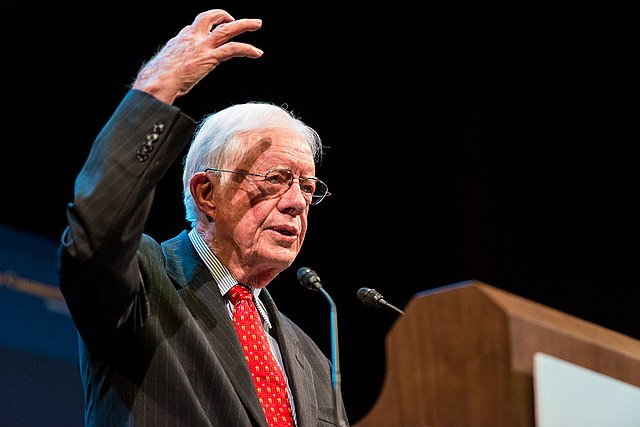Jimmy Carter, the 39th president of the United States and a Nobel Peace Prize laureate, passed away on Sunday, December 29, at the age of 100 in his hometown of Plains, Georgia. His death was confirmed by his son, James E. Carter III, to The Washington Post. The Carter Center also announced the news on social media, bringing to a close a life defined by dedication to public service, humanitarian work, and advocacy for peace.
Carter's wife of 77 years, Rosalynn Carter, passed away just 13 months earlier at the age of 96. His final public appearance was in November 2023 at her memorial service. Together, the Carters raised four children: Jack, Chip, Jeff, and Amy, and their marriage remains the longest of any first couple in U.S. history.
Carter's presidency from 1977 to 1981 was shaped by significant domestic and international challenges. His administration achieved notable successes, including brokering the Camp David Accords between Egypt and Israel and restoring diplomatic relations with China. However, his time in office was overshadowed by economic struggles, an energy crisis, the Iran hostage situation, and controversial decisions such as the boycott of the 1980 Moscow Olympics. These issues contributed to his defeat in the 1980 presidential election to Ronald Reagan.
After leaving office, Carter redefined the role of a former president. He and Rosalynn established The Carter Center in 1982, focusing on advancing human rights, eradicating diseases, and promoting global peace. The center's efforts led to groundbreaking progress in reducing cases of Guinea worm disease, from millions globally to near eradication. His post-presidency work earned him the Nobel Peace Prize in 2002 for his commitment to advancing democracy, human rights, and conflict resolution.
Carter's early life was rooted in modest beginnings. Born James Earl Carter Jr. on October 1, 1924, in Plains, Georgia, he grew up in a segregated community. After graduating from the U.S. Naval Academy, he served as a nuclear engineer before taking over his family's peanut farming business. His political career began in the Georgia State Senate and progressed to his election as governor in 1970, where he gained national attention for his progressive stance on desegregation.
Despite numerous health challenges in his later years, including cancer, falls, and hospitalizations, Carter remained active. His work with Habitat for Humanity continued well into his 90s, building homes for low-income families. He often credited his long life to his partnership with Rosalynn, whom he described as his greatest supporter and source of inspiration.
Carter's legacy extends beyond politics to his profound impact on humanitarian efforts. His ability to blend moral clarity with humility resonated with many. Pennsylvania farmer Wayne Harpster, a close friend since 1979, described Carter as a man who never lost touch with his roots, saying, "He's still President Carter to me."
Carter's faith journey was a cornerstone of his life. His grandson, Jason Carter, reflected on the significance of his time in hospice care, describing it as a deeply meaningful phase that allowed Carter to reflect on his spiritual beliefs. Carter's decision to enter hospice in February 2023 came after a series of hospitalizations, marking his final chapter surrounded by family and loved ones.
Carter outlived the two presidents who followed him, Reagan and George H.W. Bush. He will be laid to rest in Plains, Georgia, the small town where his extraordinary journey began and where his legacy of service will be remembered for generations.






